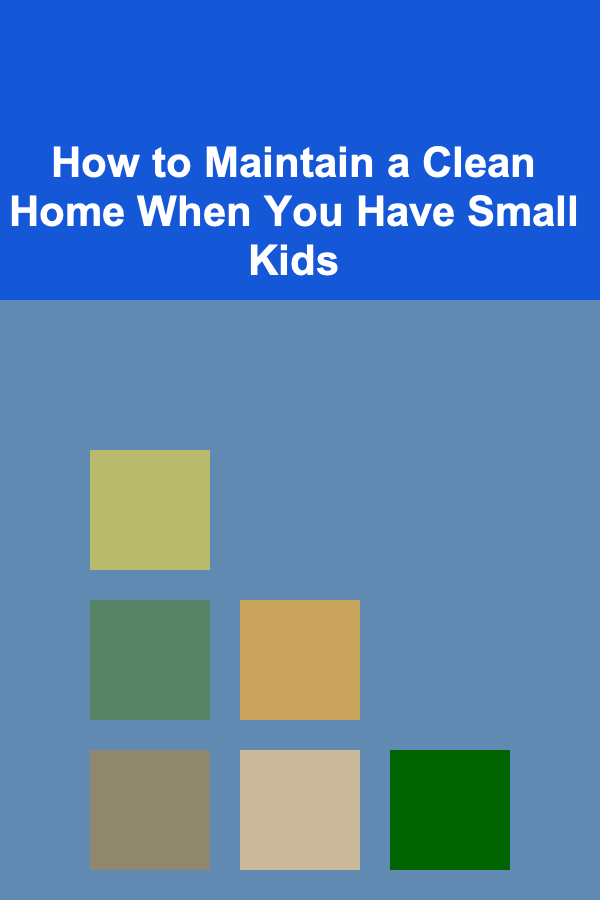
How to Maintain a Clean Home When You Have Small Kids
ebook include PDF & Audio bundle (Micro Guide)
$12.99$7.99
Limited Time Offer! Order within the next:

Having small children in the house can be both a joy and a challenge. While their laughter, energy, and curiosity bring life to any household, the chaos they can create can sometimes make it feel impossible to keep your home clean. Toys scattered across the floor, sticky fingerprints on the walls, and food crumbs everywhere can seem overwhelming, but with the right approach, it is entirely possible to maintain a clean and organized home while managing the demands of raising young children.
In this article, we will explore practical strategies and helpful tips to help parents maintain a clean home with small kids. By establishing routines, setting realistic expectations, and using the right tools, you can create an environment that is both tidy and comfortable, all while nurturing your little ones.
Understanding the Challenges of a Clean Home with Small Kids
Before diving into strategies, it's essential to understand why maintaining a clean home with small kids can feel like an uphill battle. Kids are naturally curious and love to explore their environment. They spill things, drop food, and tend to move things around in a way that may not align with the adult concept of "tidy." Furthermore, children under the age of five are still learning how to manage their own messes, and as a result, parents bear most of the responsibility for cleaning up after them.
The challenge comes from the balance between caring for your child's needs and keeping the home neat and organized. Babies and toddlers often require constant supervision, which means that cleaning becomes a task squeezed between naps, meals, and playtime. However, with the right mindset and approach, cleanliness doesn't have to take a backseat to parenting.
Setting Realistic Expectations
The first step in maintaining a clean home with small kids is adjusting your expectations. You cannot expect a home with young children to remain spotless at all times, and that's okay. Accepting that messes are a natural part of raising children will help you avoid feelings of frustration or guilt. A clean home doesn't have to be a picture-perfect model from a magazine; it simply needs to be functional and safe for your family.
Instead of striving for perfection, focus on creating a space that is organized and easy to maintain. Aim for an environment that feels comfortable, relaxed, and manageable. Once you set realistic expectations, you'll feel less pressure to keep up with the constant mess and be more proactive in keeping things tidy.
Create a Cleaning Routine
One of the best ways to maintain a clean home with small kids is to develop a consistent cleaning routine. While it may seem like there's always something to clean, having a set schedule can help you stay on top of tasks and prevent your home from becoming overwhelmed with mess.
Daily Tasks
Small daily tasks are crucial for keeping things in order. Here are some activities to include in your routine:
- Tidying up after meals: After every meal, wipe down the dining area, clean the highchair, and sweep the floor. If you wait until the end of the day, crumbs and spills will pile up and become harder to clean.
- Toy management: Encourage your kids to help tidy up their toys at least once a day. Set up a specific area for toys to go, such as a toy bin or shelf, and make it a habit to put them away after playtime. Make this fun by turning it into a game.
- Spot cleaning: Wipe down surfaces, including tables, countertops, and bathroom sinks, as needed. Kids are prone to leaving sticky or dirty spots everywhere, so keeping a cleaning cloth or disinfecting wipes handy can help tackle small messes quickly.
Weekly Tasks
In addition to daily cleaning, incorporate weekly tasks that tackle more significant messes. These include:
- Vacuuming and sweeping: With young children, crumbs are inevitable. Make it a point to vacuum or sweep the floor at least once or twice a week. Focus on high-traffic areas, such as the kitchen, dining room, and playroom.
- Laundry: Keeping up with laundry can be a never-ending task when you have kids, but setting aside one or two days a week to do laundry will prevent the pile from growing out of control. Consider folding and putting away clothes as soon as they come out of the dryer to avoid clutter.
- Bathroom cleaning: Kids often leave the bathroom in a state of chaos, so it's essential to clean the bathroom regularly. Wipe down surfaces, scrub the tub, and sanitize the toilet each week to keep germs at bay.
Monthly Tasks
Lastly, set aside time each month to tackle larger cleaning tasks, such as:
- Deep cleaning: Focus on areas that are easily overlooked in a regular cleaning routine, like baseboards, windowsills, and ceiling fans. Take the time to wash curtains and deep clean carpets.
- Organizing toys and clothes: As your child grows, they may outgrow certain toys and clothes. Go through their items each month and donate or store anything they no longer use. This helps prevent unnecessary clutter from accumulating.
Having a consistent cleaning routine helps keep your home manageable without requiring long, exhausting cleaning sessions.
Involve Your Kids in Cleaning
It's never too early to teach children about cleanliness. In fact, involving them in age-appropriate cleaning tasks can help create a sense of responsibility and pride in their environment. While young children might not be able to do heavy cleaning, there are many ways they can participate.
Simple Cleaning Tasks for Toddlers
- Picking up toys: As mentioned earlier, teaching toddlers to put away their toys after playtime is an excellent way to involve them. Use simple commands like, "Can you put the blocks in the bin?" and encourage them with praise.
- Wiping surfaces: Toddlers can help wipe down lower surfaces like tables and countertops. Provide a damp cloth and allow them to "clean" areas that are within their reach.
- Sorting laundry: Toddlers can help with laundry by sorting clothes into piles. For example, they can match socks or put similar colors together. It's a fun way to teach them about sorting and organization.
Involve Older Kids in More Complex Tasks
As children get older, they can take on more responsibility in helping to clean. For example:
- Vacuuming: Older children (4-5 years old) can start using a lightweight vacuum to help with smaller cleaning tasks.
- Making their bed: Encourage your kids to make their bed each morning, which helps build a sense of routine and pride in their space.
- Dusting and wiping down surfaces: Children who are old enough to follow simple instructions can help dust furniture and wipe down surfaces with a cleaning cloth.
Turn Cleaning into a Game
To keep things fun and engaging, turn cleaning into a game. You can create challenges like, "Let's see who can pick up the most toys in five minutes!" or "Can you beat your last time cleaning the table?" This adds an element of fun to a typically mundane task.
Optimize Your Space for Easy Clean-Up
When you have small children, it's important to optimize your home for quick and efficient clean-up. By designing your space to be organized and functional, you'll spend less time hunting for lost toys or cleaning up messes.
Create Designated Spaces for Toys
Instead of allowing toys to scatter throughout the house, designate specific areas for playtime. Set up bins, shelves, or toy chests for easy storage. Teach your kids that toys belong in their designated spaces and encourage them to put things away after they're done playing.
Keep Cleaning Supplies Accessible
It's helpful to keep cleaning supplies within reach so you can quickly tackle messes. Store kid-friendly cleaning products under the sink or in a closet where you can easily grab them. Consider using non-toxic and safe cleaning products to ensure that they're safe for little hands.
Use Easy-to-Clean Furniture and Fabrics
When choosing furniture and fabrics, opt for materials that are easy to clean and maintain. For example, choose leather or faux-leather furniture that can be wiped down easily, or choose washable slipcovers for your couch. Avoid delicate fabrics that can stain easily, as kids are prone to spills and accidents.
Make Cleaning a Family Affair
Maintaining a clean home when you have small kids is a team effort. It's essential to involve everyone in the household, including your partner, in the cleaning process. Share the responsibilities, and don't hesitate to ask for help when you need it.
If you feel overwhelmed, communicate with your partner about creating a division of labor that works for both of you. You may also want to establish a set time each week for deep cleaning together as a family.
Conclusion
Maintaining a clean home with small kids may never be an entirely seamless process, but by developing routines, involving your kids in cleaning, optimizing your space, and setting realistic expectations, you can stay on top of the mess and keep your home tidy. Remember, it's not about perfection---it's about creating an environment that works for both you and your children.
With a bit of patience, creativity, and teamwork, you can enjoy a comfortable and organized home while nurturing your kids' growth and development. By making cleaning a fun, collaborative effort, you'll teach your children valuable life skills and set the stage for a more organized, clutter-free home.
Reading More From Our Other Websites
- [Home Storage Solution 101] How to Design a Practical Storage Room for All Your Extras
- [Home Maintenance 101] How to Keep Your Lawn Healthy and Green: Top Lawn Care Tips
- [Home Budget Decorating 101] How to Upgrade Your Lighting with Affordable Fixtures
- [Personal Care Tips 101] How to Select a Facial Scrub for Combination Skin
- [Home Cleaning 101] How to Organize and Clean Your Laundry Room
- [Home Storage Solution 101] How to Design a Functional and Beautiful Kitchen Island with Storage for Busy Families
- [Star Gazing Tip 101] How to Identify the Ten Most Visible Constellations to Start Your Night Sky Journey
- [Personal Care Tips 101] How to Choose the Best Face Masks for Sensitive Skin
- [Home Pet Care 101] How to Prepare Your Pet for a Long Car Ride
- [Home Budget 101] How to Create a Financial Roadmap for Your Home Budget: A Step-by-Step Guide

How to Choose the Best Vacuum Cleaner for Your Home
Read More
How to Plan and Save for Your Child's College Education
Read More
How to Secure Your Backyard from Intruders
Read More
How to Set Up a Personal Library for Luxury Coffee Table Books
Read More
How to Set Up a Safe and Comfortable Living Space for Your Pet
Read More
How to Soundproof Your Home for a Better Night's Sleep
Read MoreOther Products

How to Choose the Best Vacuum Cleaner for Your Home
Read More
How to Plan and Save for Your Child's College Education
Read More
How to Secure Your Backyard from Intruders
Read More
How to Set Up a Personal Library for Luxury Coffee Table Books
Read More
How to Set Up a Safe and Comfortable Living Space for Your Pet
Read More